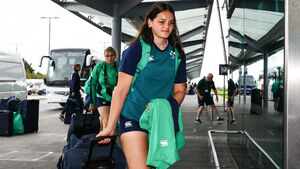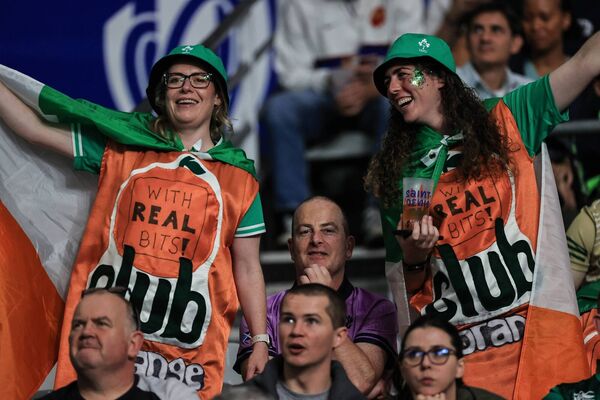Rugby is no longer confined to a niche market

Ireland Women's Rugby Team Airport Depart Dublin Airport for Dubai, Dublin Airport, Dublin 6/10/2023
As the Rugby World Cup progresses in France, you can be sure plenty of the Irish supporters have taken in the local landmarks around Paris, where Andy Farrell's side played two of their pool matches and will return for the showdown with the All Blacks this Saturday.
One such attraction is the tomb of Oscar Wilde, the widely renowned Irish poet and playwright who died in 1900.
Wilde made his name as one of the pre-eminent writers of the late 1800s in London, but died at the early age of 46 having contracted meningitis. This came after a spell in prison following an infamous trial.
Born on Westland Row, just south of the Liffey in Dublin city, Wilde grew up a short distance from the home of Irish Rugby at Landsowne Road. As well as his writing, Wilde coined a number of oft-repeated phrases during his time on earth. One of them, in particular, has a focus on the sport many have been fixated by over the last number of weekends.
“Rugby is a game for barbarians, played by gentlemen. Football is a game for gentlemen played by barbarians.” All eyes this week will be on Ireland's clash with New Zealand in what has the potential to be a terribly tasty quarter-final. Should Ireland win? On all form, probably just. Will they? Who knows.
New Zealand may have come out of the blocks slowly following an underwhelming defeat to France in their first match, but the hammerings they gave Italy (96-17) and Uruguay (73-nil) suggest they may be coming to form at just the right time. They also have one Joe Schmidt plotting a way past the Irish juggernaut in the background.
Ireland, though, are a much different side to the one hammered by the All Blacks at the 2019 tournament and, likewise, so too are New Zealand. The All Blacks, while still a formidable opponent, no longer carry that air of invincibility. Incredibly, in the last eight test matches between the sides, Ireland have won five, having gone 111 years waiting for their first victory in the fixture.
The way in which the Irish public has bought into following this team at this World Cup – just look at the ridiculous crowds following the team in France last Saturday – is reflective of the growing nature of rugby’s prominence, in all areas of the country. It is no longer confined to a niche market.
The IRFU deserve enormous credit for the way in which they have adapted to the professional game, which it must be remembered is still in its infancy having come about in the mid-1990s. Since then, Irish provinces have won seven European Cup titles, and by and large they have become very successful commercial operations. Connacht’s triumph in the PRO12 in 2016 further underlined that progress. The model being adopted here, and the strong relationship between provinces and the Irish set-up, is the envy of others around the rugby world.
“The way Irish rugby is set up,” Gregor Townsend, the Scotland coach, commented in the aftermath of Saturday’s defeat, “they could dominate world rugby for the next five, ten years.

“They’re the number one team in the world and they have a pro-rugby system that is very strong and they’ve got an age-group system that is very strong.” While we’re all engaged by Ireland’s tilt at outright glory, it could be argued that the major story of the Pool stages hasn’t been about the bigger nations at all. The unmerciful hammerings at this tournament have been the major talking point thus far, with few shocks emerging in the opening weeks of the tournament. Eight pool matches had a winning margin of more than 60 points.
World Rugby has plans to expand the tournament to 24 teams but on the large amount of evidence from this tournament alone, there is little to suggest that such a decision would lead to more competitive fare in the early rounds. Granted, you could argue that the lopsided nature of the draw has led to some of the hammerings but it’s also symptomatic of a much more deep rooted problem of nations failing to make themselves sufficiently competitive to really mix it with the big guns on the world stage.
The expansion to 24 teams will make it somewhat easier from a logistical point of view but it is also neat from a commercial standpoint. The likes of the United States, Canada and Spain are all big population and economic areas for rugby to really target – yet none of those teams are at this tournament. The new format will ensure they are less likely to miss out in 2027. How World Rugby goes about addressing that significant gap between the tier one sides and those below should be the key target in the years ahead of the next World Cup, and beyond.
For all of the bad stuff, though, I would still argue having the emerging and developing nations at the World Cup is a positive thing when you weigh it all up. For every hammering, there has also been a decent game or two among some of those tier two sides at this tournament. Uruguay and Portugal, in particular, have shown some real attacking flair.
Portugal's win over Fiji on Sunday evening was largely academic in the wider scheme of things (Fiji still advanced to the knockout stage) yet it is one of the standout moments of the last number of weeks. For many of the nations’ struggling at this World Cup, the achievement of getting there is an achievement in itself. Much like it is for the Republic of Ireland to reach a World Cup or European Championships in football.
Given Ireland isn't involved in a qualification process per se, it can be easy to forget that some of the sides in the lower tiers are battling tremendously hard to reach the tournament at all. When they get there, it blows the interest up in the country and any positive result on the world stage can be a landmark moment. As French commentator Lauren Depret mused after Portugal's win on Sunday: “This match is the birth of a rugby nation.” And, it’s also a case of being out of sight and out of mind.
If World Rugby took a dim view of the hammerings and bowed to some voices in the game to remove Namibia, Romania and others from the World Cup in the future, we wouldn't even have a discussion on the plight of the game in these countries. Progress is possible. And at least the discussion is happening.
As the rugby fans visit Wilde’s grave in Paris over the coming weeks as the tournament enters the business end, it might also be worth remembering another of his quotes when considering the plight of nations longing for future days in the sun.
“There is only one thing worse in the world than being talked about, and that is not being talked about.”



